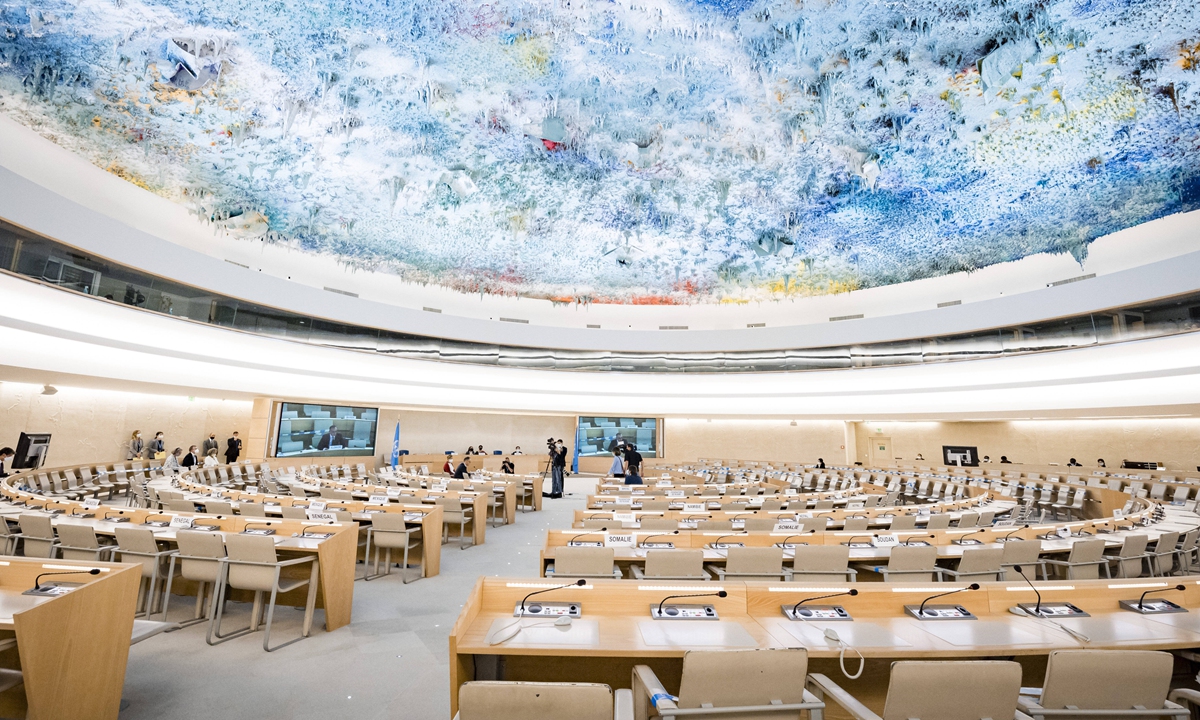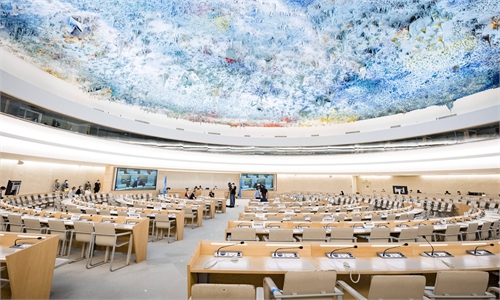UN Human Rights Council adopts resolution initiated by China and dozens of countries

Human Rights Council at the United Nations in Geneva Photo: VCG
The United Nations (UN) Human Rights Council on Thursday adopted a resolution initiated by China and dozens of developing countries, which called for the promotion and protection of economic, social and cultural rights. The adoption of this resolution indicates the increasing acceptance of China's proposals on human rights and demonstrates that China, along with more developing nations, is working to advance the cause of international human rights in the wake of the alarming attempts by the US and some Western nations to politicize human rights issues, analysts said.
The resolution, titled "Promoting and protecting economic, social and cultural rights within the context of addressing inequalities" was adopted without a vote and it was initiated by 80 countries including China, Bolivia, Egypt, Pakistan, South Africa, Syria and Venezuela at the 54th session of the Human Rights Council, according to a release sent to the Global Times from China's Permanent Mission to the UN Office at Geneva and other International Organizations in Switzerland on Friday.
In introducing the resolution at the session, Ambassador Chen Xu said that the resolution seeks to promote consensus among all parties on the issue of inequality and economic, social, and cultural rights, and calls for strengthened international cooperation to promote economic, social, and cultural rights through capacity building.
While requesting the High Commissioner for Human Rights to strengthen work in this field, the resolution also proposes establishing a knowledge center for economic, social, and cultural rights to provide a platform for equal exchanges on relevant issues among countries.
Developing countries have spoken one after another expressing gratitude to China and other proposing countries, stating that the resolution effectively responds to the strong call for increased investment in economic, social, and cultural rights and the construction of a just and inclusive international order. It conforms to the historical trend of rebalancing the multilateral human rights system and is conducive to the healthy and long-term development of the international human rights cause.
It is not uncommon for multiple countries to jointly submit resolutions and the more countries that jointly propose a resolution, the higher the degree of consensus in the international community on the issue, Mao Junxiang, executive director and professor at the Human Rights Studies Center at Central South University, told the Global Times.
The resolution adopted on Thursday was joined by 80 countries, which means that at least 80 countries have reached the highest level of consensus on this issue, which highlights China's active role in the global human rights governance and in promoting the formation of more human rights standards based on consensus as a member of the Human Rights Council, Mao noted.
Moreover, the resolution was adopted without a vote, which means it reflects the voice of the vast majority of developing countries, according to Mao.
The resolution also conforms to the historical trend of rebalancing the multilateral human rights system and is conducive to the healthy and long-term development of the international human rights cause, said analysts, adding this is why the resolution was so well received.
Video footage from the scene uploaded on the UN Human Rights website showed that developing countries thanked China and other proposing countries as the resolution effectively responded to the strong call for increased investment in economic, social, and cultural rights and the construction of a just and inclusive international order.
Moreover, representatives from the EU, France, Germany, and other countries also expressed their willingness to participate in negotiations.
The fact that this resolution was passed in such a highly consensual manner also indicates that China's position has been recognized by the widest range of member states, Chang Jian, director of the Research Center for Human Rights at the Tianjin-based Nankai University, told the Global Times.
Over recent decades, China has made remarkable progress in guaranteeing economic, social, and cultural rights, and set a good example for the international community. Many developing countries sincerely appreciate China's efforts in poverty reduction, medical security, social insurance, and education system that cover the entire population, Chang noted.
Many of China's approaches have been recognized on the international stage, which reflects China's increasing influence in the field of international human rights, analysts said.
On October 10th, China was successfully re-elected as a member of the Human Rights Council at the 78th session of the United Nations General Assembly, with a term from 2024 to 2026.
Chang Jian believes that being re-elected as a member of the Human Rights Council for a sixth time is extremely rare. And it shows that China is increasingly actively participating in UN human rights affairs and has become a positive and constructive force in global human rights governance.
"This is of great significance, as it reflects China's rising international status and further demonstrates that China's human rights situation is not as portrayed by the West, but has achieved remarkable achievements," said Chang.
Prior to this election of council members, some Western countries and anti-China forces still attempted to smear China's human rights record with unfounded accusations.
Chang noted that in global human rights governance, some Western countries highly politicize and weaponize human rights, turning human rights what should be a noble cause for people worldwide into a geopolitical tool. They use human rights to stigmatize and even sanction other countries, bringing destructive impact to global human rights governance and undermining the foundations of human rights.
Mao also noted that China's successful re-election undoubtedly demonstrates that China's contribution to international human rights has been unanimously recognized by the international community.
While taking into account the voices of developing countries, China plays a significant role in global human rights governance. Mao noted that the construction of a community with a shared future for mankind, and the promotion of human rights through development, including the resolutions passed today, are all contributions made by China in the international community.
China contributes its human rights concepts to the international community in a more just, reasonable, and inclusive manner, rather than promoting its ideas through coercive means like some countries. While basing itself on its own position, China reflects the largest consensus, which often gains recognition from other countries.


